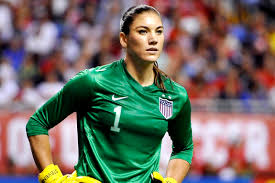January 14 – Former US women’s international goalkeeper Hope Solo says the current national team are not doing nearly enough in their quest for equal pay.
Solo, who represented her country for 16 years and won the 2015 women’s World Cup, is pursuing her own lawsuit against the US Soccer Federation citing gender discrimination and says a lot of the fight by her compatriots, whose claims of wage discrimination were dismissed last year pending appeal, has so far has been “empty words”.
“A question we must all ask ourselves is whether there is a line that you will not cross to stand up for what you believe in,” said Solo. “You want to motivate and inspire people and sometimes that may take us across that line of comfort.”
Solo told the BBC’s The Players podcast: “Anybody can speak on the microphone or wear a shirt or tweet something out, but how do you actually get things done? We have to stand up together and be strong together and make sacrifices and that hasn’t been done yet.”
“I believe that sacrifice has to be made and work has to be put in and when I say work I mean legal documents, meeting with politicians, Congress and the US Senate. People in power don’t want to give women equal pay. We have to fight for it.”
“I think the US women’s national team isn’t doing enough. We had the ability to get equal pay four years ago and the current players passed on that because they agreed to the new contracts.”
The United States won the Women’s World Cup for the fourth time in France in 2019 and have won Olympic gold five times while the US men failed to even qualify for the 2018 World Cup in Russia.
Solo, one of the greatest women’s goalkeepers the game has seen, has never been short after controversy and had her contract terminated in 2016 after she called Sweden “a bunch of cowards” for their defensive style in their shock Olympic quarter-final win over her country.
She described the US team as having a “very privileged, white culture” when she first joined the squad and recounted her experience of being bullied.
“We were bullied, let’s be honest. You’re supposed to be competitive, and you want to join the team and be the starter, but at the same time if you have that sense of confidence in yourself, it’s not always a good thing. You have to earn every step of it.
“When we grew up on the team it was cut-throat. People were not nice to us, people were not welcoming, they didn’t invite you to sit at the dinner table. It was really difficult growing up on the national team for me in a social aspect as well as learning the game. It is a much more open and welcome environment [now].”
Contact the writer of this story at moc.l1751507226labto1751507226ofdlr1751507226owedi1751507226sni@w1751507226ahsra1751507226w.wer1751507226dna1751507226

